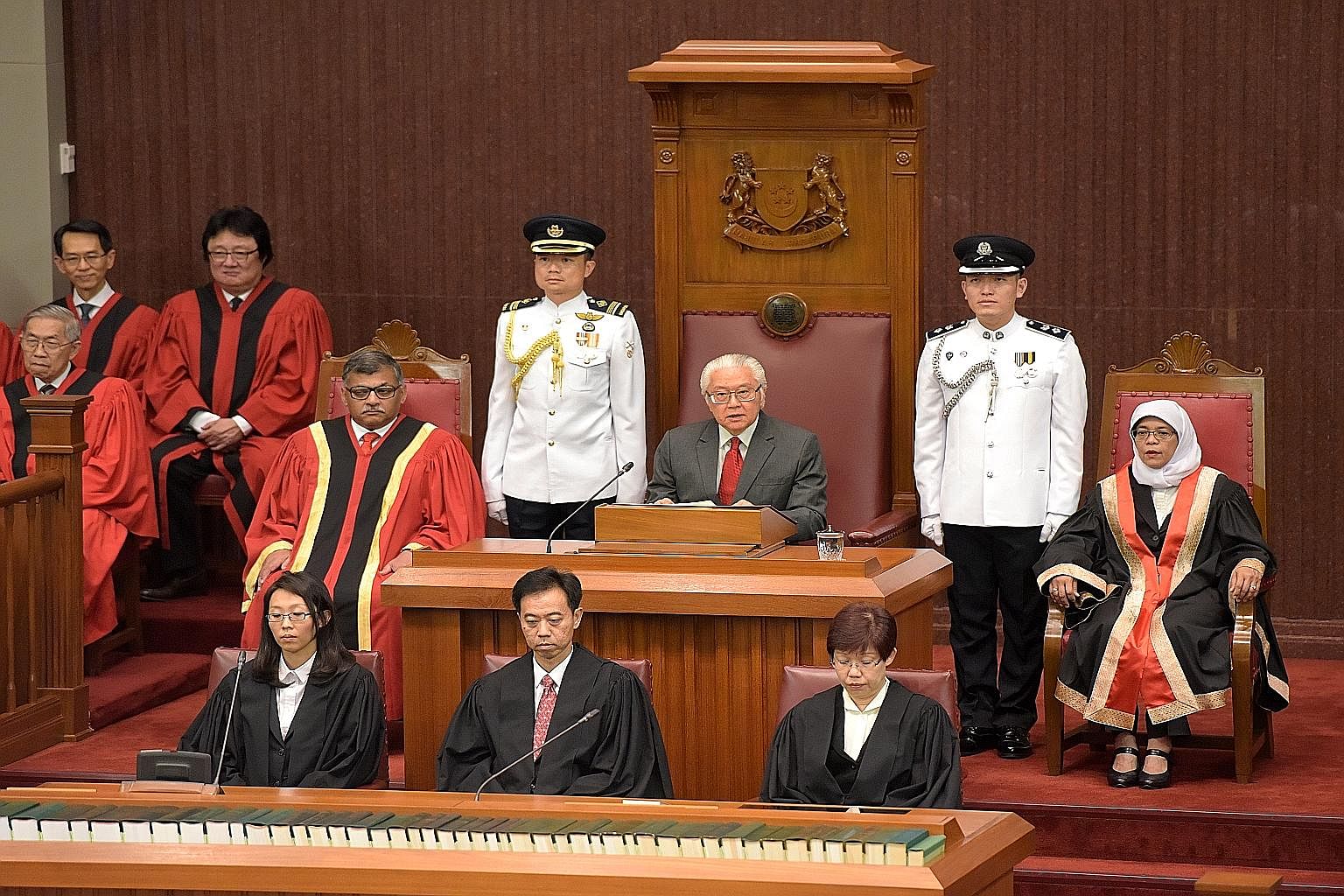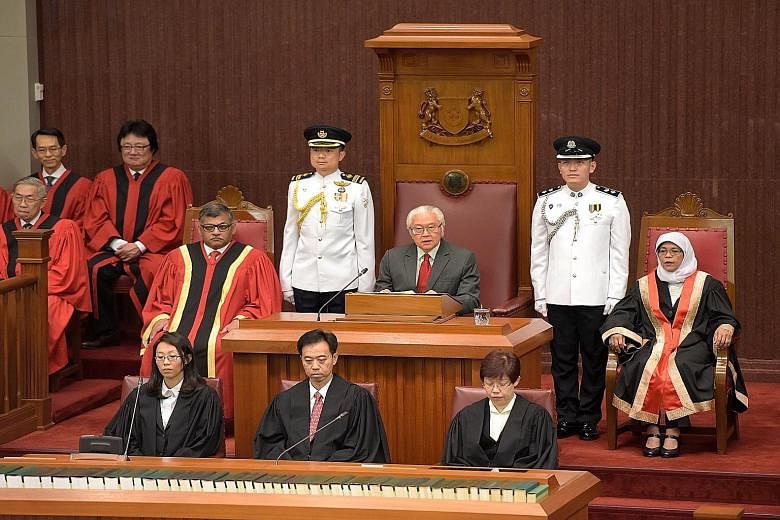In his commentary "Let's talk about policy failures and the elected presidency" (The Straits Times, Jan 18), Professor Kishore Mahbubani argues that our policy of an elected presidency should be revisited, and perhaps "the time has come to do a U-turn", stop having direct elections and go back to the previous practice of having Parliament elect the president.
His concern is that Singaporeans might elect a "rogue president" who would create "painful political tensions" with the responsible government in power.
Prof Mahbubani's concern is legitimate. But the way forward is not a U-turn. Rather, what is needed is a collective effort to determine how we can reduce the likelihood of electing such a rogue president, while enhancing the elected presidency as a sentinel to good governance.
This is timely in the light of President Tony Tan Keng Yam's call to ensure "good politics and leadership" in his address at the opening of the 13th Parliament last Friday. To that end, the Government will study whether and how to refresh the political system so that Singapore will have a "clean, effective and accountable government over the long term".
The institution of an elected president was itself born out of the fears of a "rogue government" ruining Singapore. In the context of Singapore's one-party dominant political system, this need for ample and robust checks and balances cannot be taken lightly.

Singapore has had four presidential elections (1993, 1999, 2005 and 2011), of which only the first and the last were contested. Although the elected presidency was the culmination of an intense period of significant constitutional redesign and engineering, the matter was also keenly debated in and outside of Parliament. There was also the publication of two White Papers on the elected presidency in 1988 and 1990.
It bears noting that the elected presidency system does not, in any way, detract from the fact that ours is a parliamentary system of government in which executive power and responsibility reside with the Cabinet. Under our Constitution, the elected president is not a separate, countervailing power to the elected government. The elected president's role has been likened to a "second key", a watchdog and a custodian.
Through his custodial powers, the elected president provides an additional layer of checks and balances - which did not exist previously - in specifically defined critical areas, including the drawdown of past reserves, key appointments in the public service, corruption probes, preventive detentions under the Internal Security Act and restraining orders under the Maintenance of Religious Harmony Act.
Thus far, presidents ranging from Mr Wee Kim Wee (the last president elected by Parliament but the first to exercise the custodial powers) to the incumbent have endeavoured to further the fundamental purpose of the elected presidency - that of furthering the robustness and sustainability of Singapore's system of good governance. Often, this means having a constructive, rather than combative, relationship with the Cabinet to enhance the quality of governance.
What is most visible to most Singaporeans are the ceremonial trappings of the elected presidency. For example, foreign dignitaries call on him, ambassadors and high commissioners present their letters of credence to him, and he officiates at the National Day Parade and the opening of Parliament.
Not visible to the public eye is the regular and careful exercise of his constitutional powers. Like a home alarm system, just because it is not activated does not mean that it has not served its purpose. In fact, its non-activation may point to the fact that the alarm has successfully deterred intruders.
The drawdown of past reserves in 2009 to help tide Singapore through the severe economic downturn is a good example of how institutional checks and balances can also function collaboratively as enablers of good governance.
After consulting the Council of Presidential Advisers, then President S R Nathan made the move in February 2009 to support the Government's decision to use past reserves to fund the $4.9 billion needed for two special schemes - one to help save jobs and the other to ease credit for firms. His decision was instrumental in tackling Singapore's worst recession since independence.
The nub of the issue is whether there is a better mode of selecting the elected president. The challenge here for institutional process and design of the elected presidency is whether a competitive election is suitable for electing a head of state who is constitutionally required to be non-partisan and apolitical. Can voters elect a person of deserving merit without politics and popularity being the dominant considerations? I doubt we can square this circle.
The current process of a competitive election may unwittingly result in the institution of the presidency itself becoming politicised. This was vividly evident in the 2011 Presidential Election. Then, the four candidates had competing and conflicting visions of the office, which were often at odds with the elected president's powers provided for in the Constitution. Furthermore, the 18-year interval between the two contested elections did not enable Singaporeans to gain a better understanding of the institution, especially its role and powers.
However, to do away with the direct, competitive election of the president now would only undercut the raison d'etre of the elected president and his political and moral authority to stand up to the elected government. A president elected by a People's Action Party-dominated Parliament may not have the same standing or legitimacy.
As the next presidential election is expected to be around August next year, at the end of the current six-year term, what is urgently needed is comprehensive public education to explain the role and powers of the elected president to Singaporeans. An informed electorate will not find agreeable a candidate who overreaches or overpromises, thus reducing the likelihood of a rogue president being elected. Making hasty changes based on concerns from the 2011 Presidential Election would be unduly reactionary.
The 2011 election may well be an aberration in terms of it being highly politicised. The strong ground sentiments, polarised political loyalties and emotions that came in the aftermath of the so-called "new normal" May 2011 General Election are unlikely to be repeated.
Prof Mahbubani is correct that where the elected presidency does not fare as well as its predecessor is in having the office of the head of state as a unifying institution in a multiracial society rotated among the different ethnic groups.
But there is no reason Singaporean voters will not elect a non-Chinese who is both meritorious and popular.
I am confident that, in the fullness of time, such a candidate will be elected. In so doing, Singaporeans would be advancing both the cause of good governance as well as nation-building.
- The writer is associate professor of law at the Singapore Management University School of Law.

